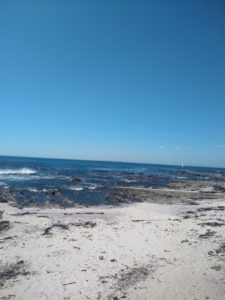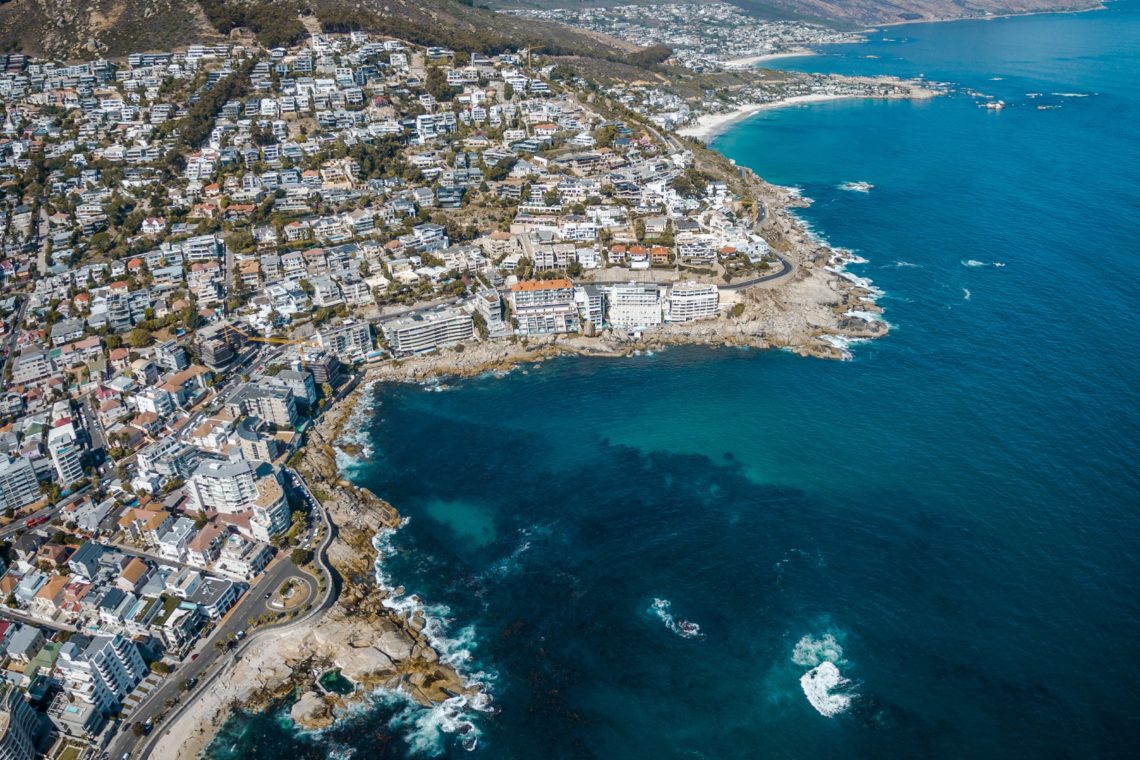We arrived at the Airbnb early, intending to drop off our bags and head to the beach. It was a beautiful day and we could see the tantalizing sparkle of the water a mere block and a half away. The apartment complex in which the Airbnb was situated may not have been particularly impressive, but the location was hard to beat.

We approached reception/security and told the guy who we were and why were there. He immediately became incredibly flustered. Asking us to take a seat in a lobby whose decor seemed inspired by Miami Vice he got on the phone and began making calls. About ten minutes passed when an older white woman with flowy clothes and dangling jewelry approached. She, who turned out to be the owner, assured us everything would be fine before grabbing the guard and hustling him up the elevator, berating him the whole way.
LB played with the stuffed giraffes while SM and I exchanged glances wondering what the hell? As it turns out, another couple had shown up claiming to be the renters of the apartment. Checks and balances failed, and they were given the key. Basically, by showing up early we interrupted a robbery in progress.
Welcome to Cape Town.
You can’t talk about South Africa without talking about crime. If you are like me you’ve heard countless media reports on the out of control violence in South Africa. A few years back I saw a documentary about gangs just taking over entire high rises in Johannesburg. In contrast Cape Town is perceived as a haven. But while Joburg has the reputation, Cape Town’s murder rate is actually double that of her sister city.
This reminds me of my hometown of Baton Rouge and our sister city, and low-key rival, New Orleans. NO is known for its violent crime being named murder capital of the US (which, in turn, is murder capital of the developed world) on more than one occasion. NO has been in the top five of murderous American cities for over thirty straight years. There is a perception here in Louisiana that my city of BR is much safer. That perception is false.
Even without NO Louisiana would still be the most murderous state in the Union. BR’s murder rate is lower than NO’s but only just. And the violent crime rate is higher. People “feel” safer in BR because BR gets far less notoriety. People also feel safer because crime in NO is less segregated. Much like in Joburg there are no really safe parts of NO, just safer parts. In contrast violent crime in BR tends to be isolated to certain systemically poor areas formed during Jim Crow and reinforced by continued redlining. Similar to how crime in Cape Town is somewhat isolated to the townships formed during Apartheid.
I did the research, but I admit to growing more and more nervous as we approached the date for our flight. In all that research one thing I didn’t discover until much later that since the fall of apartheid and rise of democracy in 1994 the murder rate in South Africa has actually fallen by almost half. From 69 per 100,000 people in 94/5 to 36 per 100,000 in 2017/18. That includes the data showing an uptick in the murder rate over the last decade.
The implication of media reports I’ve heard from the West has always been that the fall of Apartheid gave rise to rampant lawlessness. Gotta wonder who’s benefiting from that narrative…
Until 2005 I’d met only white South Africans, including an exchange student at my high school. I will always wonder what inspired her to choose a 50/50 city and school. The first non-white Saffies I met were in Jeju-do, South Korea, of all places. They, a Zulu man and a Coloured woman of Malay descent, were both from Cape Town and thoroughly unimpressed with the beauty that was Jeju. They were both younger than I and had lived much of their lives post-Apartheid. Because of this they had a much sunnier outlook on their country than most of the white South Africans I knew and would come to know.
I did not study up on South Africa’s history before our adventure in South Africa. Until then I thought Apartheid evolved organically. Like how in the US we Black people went from indentured servitude, to race based slavery, to race-based chattel slavery, to Jim Crow, lynching, and redlining, to the school to prison pipeline and other modern issues of systemic racism.
While South Africa has a long history of segregation and racial and ethnic strife, including the twins of colonization: slavery and genocide, Apartheid is more like what happened in Nazi Germany. A formerly fringe group comes into power and makes drastic and horrific changes. Things that would have been seen as barbaric just weeks earlier are suddenly enforced by law. And it happened right after the fall of the Nazis which boggles the mind.
South Africa is a country fighting deep economic inequities, high levels of violence, that struggles to admit to how much systemic racism held over from Apartheid still affects the country’s present and future. (To Americans this should sound familiar.) But Apartheid ended in the mid-nineties, less than 30 years ago. It’s really amazing how far the country has come. In some ways, farther towards inclusion and equality than the US. There are 11 national languages and the average person speaks 5! Despite what you hear on the news it feels as though people here are striving towards something astonishing. At least, that’s my two cents from my time in Cape Town.
